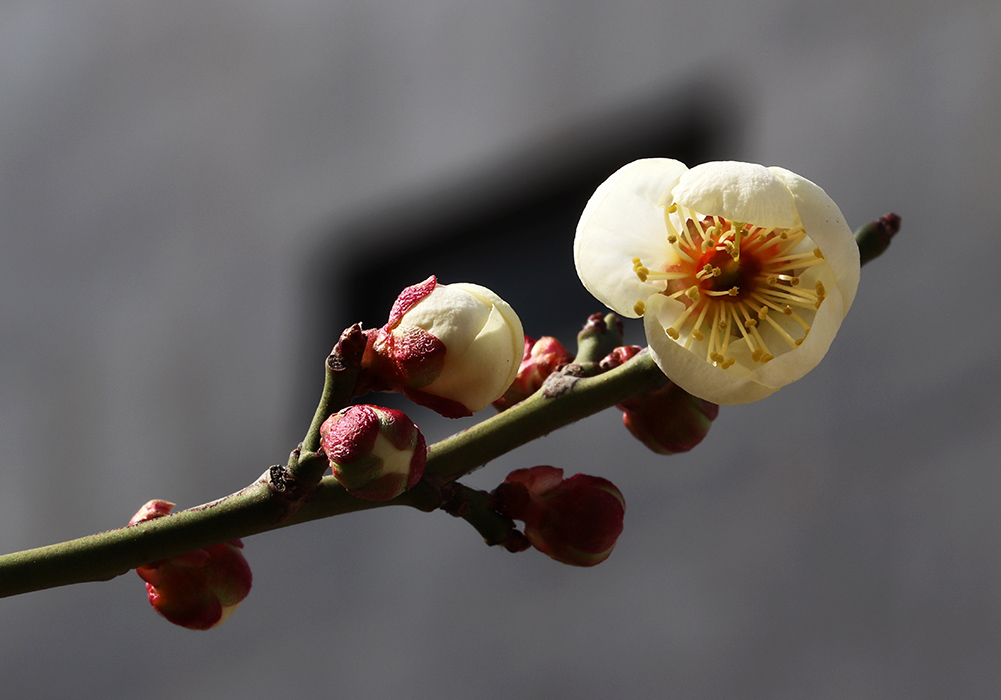
Each bud and each sister were responding to the sun, flowering in her time. An obedient tree bears fruit in due season. (Pixabay/HeungSoon)
People often begin the new year by making lists of resolutions. Many women religious engage with their congregations in discernment about future ministry or living decisions. Discernment is a serious process in religious life, as it involves the vow of obedience. We asked the panelists to reflect on this by answering the following:
Some consider the vow of obedience the most difficult. How do you or your community balance the demands of communal discernment with your personal preferences for ministry and living situations?
______

Véronique Rouquet is a member of the Ignatian congregation La Xavière, Missionnaire du Christ Jésus and lives in Creteil, near Paris. Born in Lourdes, she rediscovered the "Message of Lourdes" when she worked for the Cité Saint-Pierre (part of the Caritas network that welcomes pilgrims in need from all over the world). She made her final vows with the Xavière Sisters in 2020. She is an English teacher, working with teenagers aged 11-14. She has managed the community communication office for a year and the website for three years.
"How can I live closer to Jesus?" I answered this question by entering a religious community more than 10 years ago. I wanted to do God's will, which means to obey him. That's the reason I took the vow of obedience. To some people, that is the worst thing to do: They see it as a denial of our liberty.
Actually, when I decided to put myself at the disposal of the Holy Spirit, I knew he will never telephone me or text me to tell me what he wants! Therefore, obeying him is not a matter of executing orders, but rather trying and discerning with others — my superiors — the way in which he is leading me in the community.
In other words, taking the vow of obedience is demanding not because I would have to restrain myself, but because I need to be very attentive to God's inspirations and to refer to my superiors about them. This will help them send me on mission.
Very concretely, in our community, we try to get into the habit of discerning in the Ignatian way all the decisions we make. This helps me on the day when my superior general invites me to consider either going on with my ministry or receiving a new one. It is necessary then to ponder awhile.
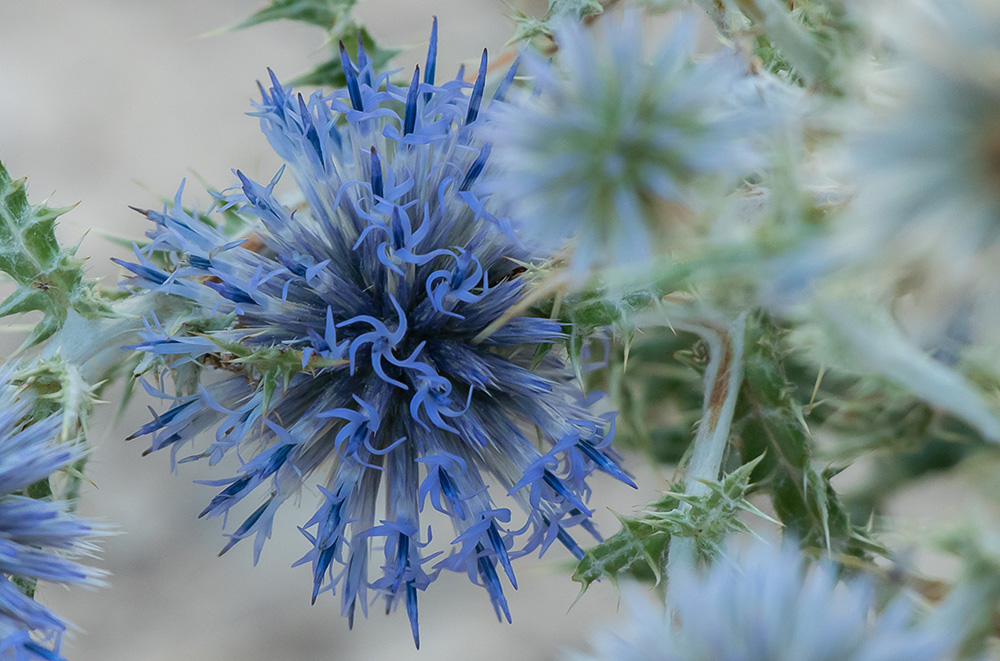
Seeing things from another perspective: close-up of a thistle (Courtesy of Véronique Rouquet)
The first step is to take a piece of paper and write the factual elements that come to my mind: what advantages and what drawbacks I see in the propositions; what meets my inner desires and preferences and what doesn't; what links I see with the charism of our community and the mission of the whole body. The answer is far from being automatic!
The second step is to set these columns aside for a while and pray, asking God to move my heart and make me see the situation not only from my viewpoint but from a larger perspective: that of the community as a whole.
This second step is a spiritual one. Sometimes, I may feel lost in a fog for a few days, but letting things evolve quietly makes it possible that eventually, something new may appear that gives peace and joy.
These two steps are important because nobody else can do them in my place. After a few days, with these elements, I can meet our superior and talk with her about what I wrote and what came up in prayer. In dialogue, she may ask other questions and help me go even further in the process of maturation.
At the end, she will make a decision, and I will be invited to follow it even if it is different from what I had felt drawn to. If that happens, the fact that I was able to share what was within me up to the end invites me to put confidence not in myself but in God who is calling — and who knows what is good for me better than I do!
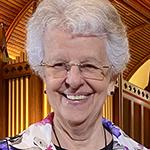
Anne-Louise Nadeau is a Sister of Notre Dame de Namur from Maryland. Her academic background was in sociology/social work and pastoral counseling. She taught in high school and college, where she also served as associate dean of students. Later, she worked in My Sister's Place (a women's center), was the director of programs for Pax Christi USA, and served her congregation on the leadership team. Currently, she is an anti-racism trainer/consultant.
When we enter our religious congregations, we are women in love.
We are in love with a lavish God we have come to know through our life experiences, retreats, friends and family, and we believe God is asking us to consider religious life.
We are in love with a congregation whose contact with its members and ministries we find attractive, and the spirit that seems to animate and energize the group is one we want to be a part of.
We are in love with an understanding of ourselves: our feelings, insights, gifts, limitations, desires, plans and views on life. In short, we have spent much time listening to the prompting of our hearts; the insights, affirmations and challenges from family and friends; and the truth we have discovered, in the words of the Greek philosophers, that "to know thyself is the beginning of wisdom."
Advertisement
In our formation years, we quickly learn to recognize the limits of our own wisdom and come to experience that what we know, we must hold lightly and must be open to what we have yet to learn.
Discernment is a part of everyday life in a congregation. Discerning what God is calling us to is not just an individual activity. It requires deep listening, reflecting with others and an openness for the unexpected.
Our vow of obedience is the articulation and action of an incarnate God on the lives of those of us called to live this vow. The word in Hebrew for obedience — shama — is to listen, to hear, to pay attention to and to align our lives to the word of God.
Our sisters in the ministry of leadership are also called to listen, to reflect and to articulate the life of the congregation. They are called to listen to each of us, to the cries of God's people, to the charism of the community, and to their own hearts in leading us to journey into a yet-unknown future.

Discerning what God is calling us to is not just an individual activity. It requires deep listening, reflecting with others and an openness for the unexpected. (Unsplash/Belinda Fewings)
Healthy leaders take all of these into consideration when asking us to discern a new ministry and/or living situation. For me, it is an invitation to take seriously their request, to be honest and open with the women in leadership and to be a part of this mutual discernment process.
However, after all is said and done and against all "my wisdom," I am asked to accept a decision that I have reservations about. This could just be the moment to let go of the fear and the feuding that is clogging my heart and to find in this ministry/living situation a new rhythm of God's grace playing itself out in me.
I continue to be a woman in love.
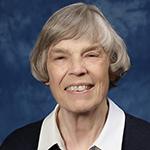
Honora Remes has been a Daughter of Charity of St. Vincent de Paul for 66 years. Born in New Prague, Minnesota, she was first attracted to the Daughters of Charity because of their vow of service to the poor. Her various ministries have included ongoing spiritual direction, annual retreats, vocation ministry, serving as pastor in several Michigan parishes in the Saginaw Diocese, serving as Daughters of Charity provincial, and offering spiritual awakening classes to homeless women in St. Patrick Center, St. Louis.
Sometimes the obedience waltz seems more like a tug of war. Here is my own experience of a graced time.
While I was pastoral associate of the cathedral in Saginaw, Michigan, our pastor's nine-year term ended. With no eligible replacement, the bishop invited me to pastor the cathedral for an interim year. After discernment with my community, I told him I didn't want a year of space-holding but would consider a term of three years. He agreed.
I explored this invitation with my local community and our provincial council, who were pleased until I said I believed it important for me to live in the rectory (as had my ordained predecessors) as a significant symbol of my non-ordained pastoral authority over cathedral parish life. Our convent was a block away from the cathedral, so I could often join in prayers and meals. But our provincial council couldn't conceive of it with the convent only a block away.
After some phoning back and forth, I met with our whole council. At the end, our provincial asked: "In obedience, Sister, will you agree to continue to sleep overnight in the sisters' home?"
"Yes, I will," I replied, "but then I will also need to relinquish the bishop's invitation to serve as pastor."
After the meeting, I prayed and received supportive letters from the bishop, Saginaw clergy and sister friends. The day before my annual retreat, our provincial called me with the council's decision: Although some still didn't think I needed to reside in the rectory, all respected my conviction that I did need to. Permission granted!
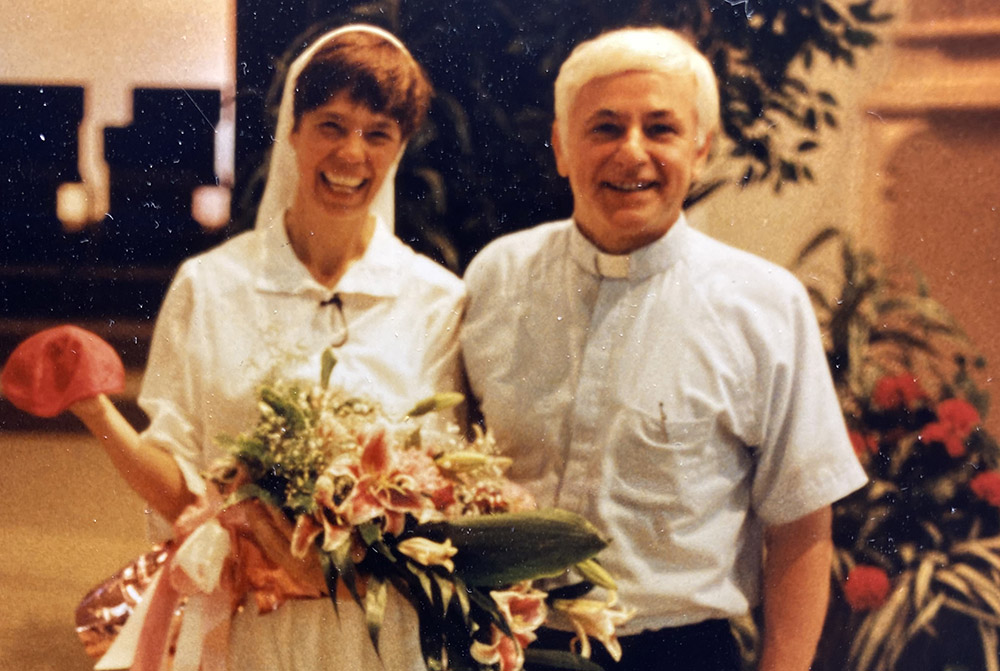
Sr. Honora Remes with Bishop Ken Untener when she was inducted as pastor of the cathedral church in Saginaw, Michigan (Courtesy of Honora Remes)
My initial term of three years gradually evolved into nine. And a friend — a Sister of Charity of Halifax who worked on the diocesan staff — later came to live in the rectory with me.
This grueling experience eventually became normative for all of us, respecting both the essence of conscience and the wisdom of community. Remembering that season of discernment, I still cherish one particular moment during the height of my communal back-and-forth phone calls with our council. Sitting in our backyard, looking out at the cathedral across the street, I prayed for wisdom. Then I noticed a nearby apple tree, just starting to bud. Tight green whorls abounded on the branches, some shyly sprouting tiny white blossoms. No apples in sight, but a promise!
For me, this respectful, organic, holy experience of nature's obedient respect for timing transformed into a symbol of our unfolding communal obedience. Each bud and each sister in our story were responding to the sun, flowering in her time. An obedient tree bears fruit in due season.
That backyard apple tree is still a symbol that through respectful communal discernment; the Spirit of Wisdom eventually yields holy, obedient, ministry-flourishing communal peace. And down the line, maybe even an apple pie.

Judith Sheridan is a Marist Missionary Sister from Massachusetts. She has worked in nursing or pastoral counseling in the United States, Jamaica, New Zealand, Australia, Bangladesh and Bougainville in Papua New Guinea and lived and worked cross-culturally with sisters from all over the world. In her congregation, she designed and administered their U.S. Global Justice and Peace Office, co-directed a residence for women victims of trafficking, and served as assistant provincial and provincial superior of the U.S. Province.
It has been enriching to give serious reflection to this question. I took my vows in 1960 with a very different understanding and appreciation of obedience. In 1960, the stress was on following the rule in order to be holy. It required you to die to self and practice a type of blind obedience.
In the ensuing years, religious life has undergone renewal, and rewritten constitutions have incorporated human and spiritual development and freedom of conscience. A mature obedience requires discernment, personal choice and a mutual search for God's will.
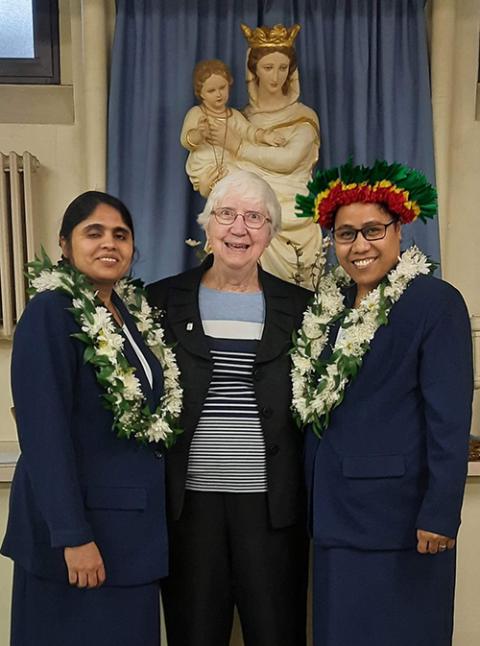
Sr. Judith Sheridan with two of her sisters — Sr. Sunitha Dipotta Anthonippillai from Sri Lanka (left) and Sr. Mira Taurannang from Kiribati (right) – at the time of their final profession in February 2021 (Courtesy of Judith Sheridan)
I asked a sister in her late 90s what the vow meant to her; she saw it as having little impact on her daily life and reserved for major moments and decisions.
On the contrary, I have come to see that obedience is a vow directly aligned to our free will. Free will is the gift God has given us so that we can choose to know, love and serve God's will; it is the engine of our lives. Obedience involves everyday choices as we live out our ministry and our living situations.
The constitutions of the Missionary Sisters of the Society of Mary have several articles on the vow of obedience rooted in Scripture and in the life and responses of Jesus and Mary. Marists are called to live their obedience with the attitude of Mary and "our Yes, spoken in faith, is offered over and over again and lived out in daily fidelity." This is our special charism that informs our obedience.
My experience has been that my superiors have dialogued with me before ministry appointments. This allows me to speak to such things as my fears and desires. I am able to say no to an appointment if I know that I do not have the skills or the training needed for the mission.
On the other hand, I discovered that when entrusted with other difficult assignments that I felt I could not do, the confidence of my superiors and others gave me the courage to try and to succeed.
As community members, we share responsibility for our obedience. This is difficult when there is tension and conflict, when I do not agree with the authority. Then, honoring my commitment means humbly accepting the decision taken.
I have committed myself out of love for God to obey those who are, for us, his representatives. This surrender of my will forms me in the likeness of Christ.
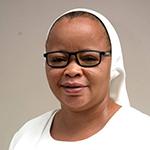
Gifty Atampoka Abane is a member of the Society of the Holy Child Jesus from Ghana. She is a teacher in a Catholic girls' high school in Ghana and serves their province in leadership.
As religious, we are privileged through our vow of obedience to learn to offer ourselves unreservedly to God and share in Christ's mission.
My initial formation involved acts of obedience in little things within community situations. Simple responses to an order, a request or a submission to an authority figure in community prepared me for personal discernment in the context of my community and ministry.
The life of obedience demands a constant formation in listening less and less to the demands of the ego and more and more to the invitation of one who stands in the person of Christ.
I consider my experience of obedience as an intentional, deliberate and conscious act of putting the self aside and surrendering to God's will. This tames the ego, the will, the intellect, the character and even the personality. It is about moving away from what is good or best for me in my own mind to what is better or best for all — the local community or the institute and for the greatest glory of God.
Obedience is a special place of grace lived through the choices we make in everyday situations. It is mostly done personally or communally, depending on what is at stake.
Each religious institute has a mission to serve in peculiar needs of church ministries and apostolates. Ours, as the Society of the Holy Child Jesus, is to help people to believe that God lives and acts in them and in our world and to rejoice in his presence.
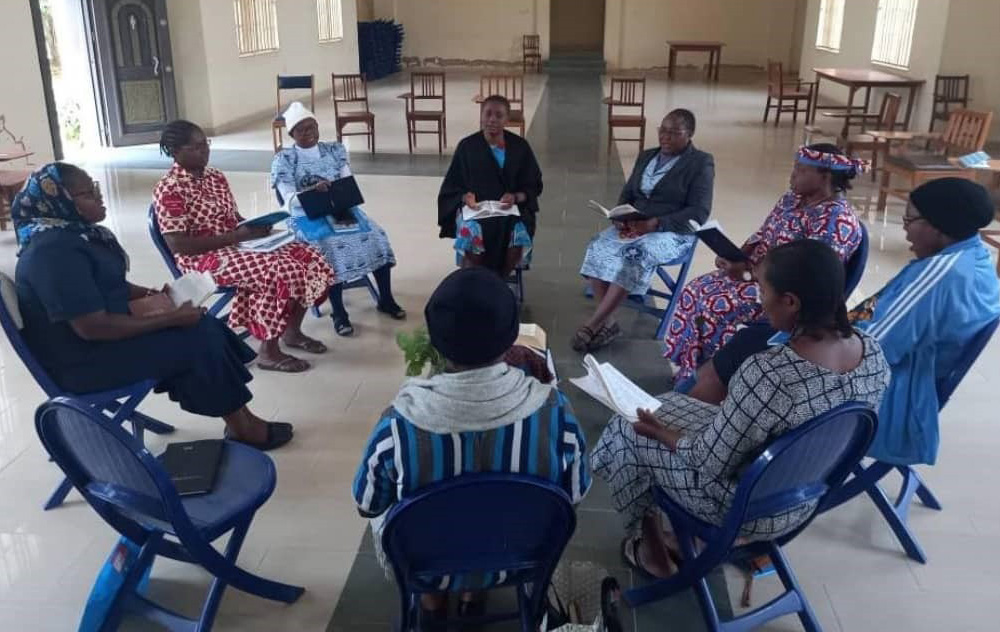
Members of the Society of the Child Jesus discern in a small group. (Courtesy of Gifty Atampoka Abane)
In the practice of obedience, members utilize their gifts and talents to achieve Christ's mission of love. We have personal desires or preferences, but the bigger picture and the demands of Christ's mission as discerned in the congregation takes precedence over our individual choice.
It is difficult to achieve 100% balance between the individual choice and community. A communal discernment is needed for all to seek and find God's will. When both the individual and the community seek God's will, graces enable us to adjust ourselves to welcome decisions made in the light of Christ.
Discernment becomes a pathway to an interior perception in the light of the Spirit for judging what God would have. It is not about choosing one good thing over the other, but identifying the best possible responses to challenges, needs or situations.
Communal discernment requires individual discernment — thus, the forms are not separable. The individual, together with the community, listens and scrutinizes interior voices to make a just decision or choice within the capability of the members for the good of community.
Through mutual discernment, the individual learns to graciously obey and witness to Christ's mission with zeal and passion.
At the individual level, I strive daily to concretely express and live out the vows I professed, including obedience — to surrender my independent decision-making to further our common mission, a sign of God's unifying work among us and among God's creaturely beings.







